Rev. Dr. A. P. Davies
1902-1957
The biographical information on this page was compiled by the A. P. Davies Committee in 1957, and copied from a brochure that commemorated the unveiling of a bust sculpted of Rev. Davies after his death. The bust may be viewed in the All Souls Library on the main floor.
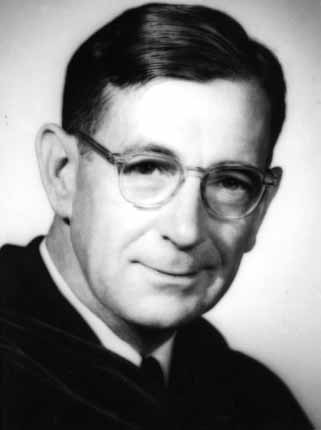
“Religion is not something separate and apart from ordinary life. It IS life-life of every kind viewed from the stand-in point of meaning and purpose: life lived in the fuller awareness of its human quality and spiritual significance.”
Probably no words of A. Powell Davies’ better express the universality and simplicity of his religious faith. Minister of All Souls Church in Washington, DC from 1944 until his death in September 1957, Dr. Davies rose to prominence as one of America’s most forthright, courageous liberal spokesmen. His influence was felt not only in his own church and community but reached out into national and international areas of concern. Whether it was a question of racial injustice in the District of Columbia, unfair methods of Congressional committees, or the needs of the underfed and underprivileged in Asia-whatever question, he spoke out simply and courageously, reaffirming his conviction that “Religion is as large as life and it should go into all parts of life, claiming truth everywhere, righteousness everything.”
Early Years
Powell Davies was born on June 5, 1902 in Birkenhead, England, a suburb of Liverpool. His mother came from Penymyndd, Wales, where, in his boyhood he spent many vacations on his grandfather’s farm. There in the large household, he loved to listen to the family’s spirited discussions. Any and all ideas were entertained and debated, and the growing boy found stimulation for his already active and adventurous intellect. As he once said of his fellow-Welshmen, “They are highly sensitive, passionate, emotionally finely balanced; poetry is natural to them. They are full of eagerness for knowledge and seem to have a natural faculty for finding the essence of things.”
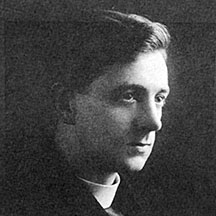
Proud as he was of his Welsh heritage, Dr. Davies early found himself fascinated with America -its founding principles, its opportunity, and, as he foresaw, its inevitable position of world leadership. So after completing his theological studies at the Universit of London, and a brief pastorage at a Methodist church nearby, he came to the United States in 1928 with his wife, Muriel Hannah Davies.
Always an unonventional preacher, even within Methodism, Dr. Davies, following a four-year pastorage in Portland, Maine, in 1033 became minister of the Community Chuch of Summit, New Jersey, where he remained for 11 years.
The Faith Behind Freedom
During the period in Summit, through magazine articles and numerous public addresses, Dr. Davies became known as an astute analyst of national and international affairs. His first book, American Destiny, published in 1942, opened with the words: “Not by design, but by necessity, the American people are moving towards world ascendancy.” He developed the thesis he continued to stress throughout his career, that America must take the leadership in a world which has become a single, vast, reluctant community. The United States, he said, “not only began with a revolution; it is a resolution, and its faith in the freedom of man is the only faith which can unite the world.”
In a statement, “The faith Behind Freedom,” drafted by Dr. Davies the following year, we read:
“We believe that freedom grows from free religion, that only a free religion can be universal, and that every other freedom is based on freedom of the mind.
“A true religion knows no barriers of nation, race or class, and no exclusions through a creed. Its unity is in its purpose; its covenant is brotherbood. As no man can be good enough to be the master of another, so no man can be wise enough to bind another in belief. Hence, we reject all orthodoxies and proclaim the Free and Universal Church.”
Dr. Davies’ devotion to free religion and to the democratic system which it nurtured was manifest throughout his career. Fellow Unitarians will think of his leadership in the movement known in his words as “Unitarian Advance,” which substantially strengthened and expanded the denomination. In this connection, Dr. Davies drafted the well-known statement of the aims and purposes that united the free Unitarian churches:
“Unitarian churches are founded upon individual freedom of belief, discipleship to advancing truth, the democratic process in human relations, universal brotherhood, unidivided by nation, race or creed, and allegiance to the cause of a united world community.”
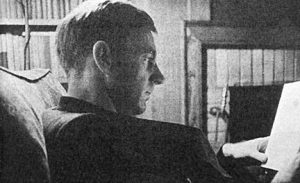
But Americans of all denominations, or of none, will vividly recall Powell Davies’ passionate adherence to the democratic faith, which, in his words, “is a believe that man, if he resolves upon it, can raise the level of his indefinitely…No fate has made him prisoner of his circumstances, no natural weakness has condemned him to be ruled by tyranny. He is meant to be free. Through the power of reason he can form intelligent opinions, and by discussion and debate can test them. Knowing that truth is previous above all things and the only safe guide to purposes and aims, the right to seek it must be held inviolate.”
The Nation’s Capital
In September 1944, Dr. Davies became minister of All Souls Church in Washington, DC. From this pulpit, and in his many addresses throughout the country, Dr. Davies continued to champion American founding principles. He vigorously opposed racial injustice, censorship, abuses of Congressional investigating committees, persecution of public servants, the activities of communist and pro-communist groups, miscarriages of justice and petty policy tyrannies.
As the Washington Post and Times-Herald commented. “To Dr. Davies, a minister was one who ‘vows himself to serve the brotherhood of man. Wherever, then, the brotherhood of man requires his service, he must try to serve it.’ It was inescapable, therefore, that he should have been militantly in the forefront of every assault upon intolerance and racial discrimination and injustice. Convenience and convention never silenced him. He was certainly the most controversial of clergymen in the Nation’ Capital. By the same token, he was, among all the member of his calling, the most resolute and indomitable champion of righteousness as he saw it and of the brotherhood of man.”
To those who took him to task for preaching about public issues, Dr. Davies replies that a minister who applies religion to public issues will be sharply criticized. “This he expects-not because he thinks that he has overstepped the boundaries of his ministerial obligations, but because he knows that religion, if it be authentic, is greatly feared and widely misconstrued.
“The reason for this is not obscure. Religion measures all things by its claim for righteousness. Since such a claim, to many folks, seems to exacting, they try to set a limit to it: religion must be walled in, preferably beneath the roofs of churches; the Kingdom of God must be a prayer, not a program; justice must be an aspiration, not an intention; and love must be a mood and not on any account a motivation.”
Religion In Action
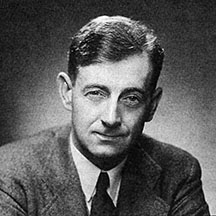
To Powell Davis, the love of truth and justice and righteousness was indeed a motivation, and he carried his convictions over into actions. He was chairman of the Emergency Conference for Civilian Control of Atomic Energy (1946), the coordinating agency which mobilized national opinion behind the McMahon Act, thus transferring the management of the Manhattan District and its related enterprises to the Atomic Energy Commission. Under his chairmanship, the Conference later pressed for confirmation of David Lilenthal as head of that Commission.
Earlier, in 1945, as President of Food for Freedom, he rallied national organizations in support of appropriations for UNRRA and of expansion of private overseas relief efforts.
Under Dr. Davies’ leadership, All Souls Church became an effective force for social action. The collection on one occasion of more than 90 tons of canned goods for overseas relief, the shipment of school supplies to the children of Hiroshima in 1947, the widely publicized pledge no longer to patronize segregated restaurants in the District of Columbia the founding of the integrated Columba Heights Boys Club in cooperation with the Unitarian Service Committee-all these are only a few examples of the religion-in-action that he inspired.
The range of Dr. Davies interests may be indicated by even a partial list of the organizations with which he worked. He was on the Board of Directors of the Unitarian Service Committee, of the Meadville Theological School at the University of Chicago, and of Federal Union, Inc. He served on councils of the Planned Parenthood Federation, the National Committee for Mental Hygiene, Americans for Democratic Action, the Population Reference Bureau, and Protestants and Other Americas united for Separation of Church and State.
A long-time student and vigorous opponent of communism, he early saw the moral issues at stake and took forthright positions while many were still confused. He was equally clear as to the menace of McCarthyism and fought it resolutely.
Meanwhile, during Dr. Davies’ ministry, All Souls Church, heir to a long and distinguished history, was experiencing it greatest growth. So many people attended the Sunday morning services that the main auditorium would not hold them all, and the overflow heard the service over a public address system in the adjoining hall. Seven new congregations were formed in the Washington area, and until they called their own ministers, four of these groups heard Dr. Davies sermons by direct wire.
His annual series of printed sermons was mailed to subscribers in all parts of the world; and on occasion, as many as 10,000 copies of a single sermon were distributed. Furthermore, many sermons were reprinted in magazines and newspapers and reached an audience numbered in the hundreds of thousands.
Scholar and Author
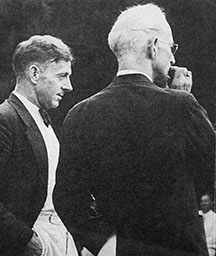
In addition to these activities, Dr. Davies found time for writing numerous magazine articles and books. His book, Man’s Vast Future: A Definition of Democracy (1951), has been translated into seven languages for distribution overseas by the U.S. Information Agency. Other books by Dr. Davies are: The Faith of an Unrepentant Liberal (1946), America’s Real Religion (1949), The Temptation to Be Good (1952), The Urge to Persecute (1955), and The Language of the Heart: A Book of Prayers (1956). In more recent years, with the growing public interest aroused by the discovery of the Dead Sea Scrolls, Dr. Davies intensified his efforts to make available to the layman the results of modern Biblical research. The two books, The Meaning of the Dead Sea Scrolls (1956) and The Ten Commandments (1956)-approximately one-half million copies of each have been printed as paperbacks-were followed by The First Christian-A Study of St. Paul and Christian Origins, completed by Dr. Davies just before his death.
To those who were shocked by the findings of modern scholarship, Dr. Davies asked, “Do we fear that the Bible will not stand investigation?”
“What this implies is that religion is only safe if it is based upon ignorance rather than knowledge, and that the truth which religion exhorts us to serve is nevertheless unfriendly to religion.
“What happens as a result of scholarly research is that we come to know how religion really developed, how it gradually and painfully made its way from one level to another, how in the mind of man there was a natural evolution of ideas, how in human society there was a slow sloughing off of barbarous customs and an ascent towards benevolence and righteousness.”
Dr. Davies was the recipient of many awards, beginning with the Theology Prize at London University in 1925. He received the honorary degree of Doctor of Divinity at the Meadville Theological School in 1947, and in 1955, Howard University conferred upon him a Doctorate of Humane Letters.
At the time of Dr. Davies death, the Washington Post and Times-Herald said” “Scholarly and learned yet earthy and pragmatic, Powell Davies was at once the spiritual leader and goading conscience of his congregation-and of the whole community… All men, indeed-all men who believe in human dignity and brotherhood-are the poorer for the passing of this courageous, fiery and yet gentle spirit.
It has been remarked that of all his many good works, perhaps the most lovably revolutionary was to make laughter part of religious service.
“Somehow,” said Dr. Davies, “religion has been thought too sacred for laughter; nobody seems to have suggested that laughter itself might be a sacred gift. Why should it be thought that no one should laugh in church? And so seldom remembered that laughter could have something to do with refreshing the soul?”
“Too often,” according to the Washington Daily News, “the religious man is a bigot, the righteous man a humorless doctrinaire, the crusader an intolerant ass. Dr. Davies was certainly religious, righteous and a crusader, but he was broadminded, witty, and kind.”
Universal Citizen
In a posthumous award, the ADA noted that “his influence was characterized by a non-pietistic approach to problems, and illuminated by a lively sense of human, and when called for, by mordant satire and flashes of anger. It extended far beyond the District of Columbia to call corners of the universe. He was, indeed, a universal citizen.”
His universality was perhaps his outstanding characteristic. “The world,” he said, “is now too dangerous for anything but truth, too small for anything but brotherhood.” “A character is no longer good that stops short of the universal claim upon it.” Again, “Our neighbor whom we must love as we love ourselves is anyone whatever and everyone whatever throughout the world.”

And in churches too, the basis should be universal. “What a shame it is that there is anything in churches that shuts men out! For what is a church but dreams and hopes and yearnings? And what is worship but the longing of the lonely human heart?… Which of us dares to say to this brother, “This is my church but it cannot be your church. The longing in your heart is not like the longing in mine. The need you have is not the same as my need. The God you seek is not a God who can be found of both of us.”
And even to those who claim to seek no God, Dr. Davies reached out a hand as a fellow pilgrim. In a sermon, “The God of the Atheist,” he quoted movingly beautiful passages from Robert Ingersoll, noted nineteenth century agnostic, who nonetheless was “so bold for truth, so quick in sympathy, so generous in compassion.: Dr. Davies quotes Ingersoll’s words: “He who loves, worships,” and added “Upon such a man I have nothing to urge. Certainly, no words of reproach. Nor do I have a wish to better his thinking, or improve his creed. If he will not kneel beside me, I will stand beside him.”
“Why should any of us be confined within a single area of religious culture?” he asked. “When I read Amos and Jeremiah, I saw ‘Would to God I were a Jew.’ When I read the Parable of the Good Samaritan, I saw ‘Would I were a Galilean.’ When I read the 13th of 1st Corinthians, I wish with all my heart that I might be a Christian after the manner of the Apostle Paul. When I think of Buddha and his Eightfold Path, I saw, ‘I, too, would be a Buddhist.’ And when I remember the trial of Socrates, I saw in awe but with exalted spirit, ‘Oh that I might be so brave a humanist.’ And thus at the end, there is nothing I can say but that, like Emerson and Channing, I want to live with the privilege of the illimitable mind.”
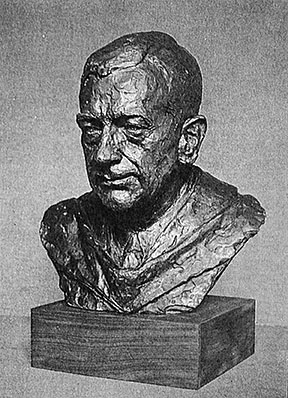
“Friends: The organizations of All Souls Church, Unitarian, have joined together to place a portrait bust of the late A. Powell Davies in this church of his greatest ministry, and thus to make the bust available to you-and to America-and to the world.
“The sculptor is Jimlu Mason, a Unitarian and an admirer of Powell Davies. She shaped her image as she viewed him at his work in life. She caught for time beyond death his visage.
“The loss of this man is great ‘…The Heaven-sent is recalled,’ but ‘…the last Rear of the host will read traces of the earliest Van.’ As long as Time shall record man’s thrusts at the sky, the spirit of Powell Davies will live.”
–Spoken by Russell Baird Adams at the unveiling of the bust of Dr. Davies, December 8, 1957
When we do not know or cannot see, help us, O Eternal, to put our trust in Thee. Even in this life, all about us and within us there is mystery. Yet the mystery shines and in its light wee see the beautiful and good. Help up believe that it is not otherwise beyond the limit of our sight; that beauty endures, that goodness reigns, that God’s other name is Love.
-A.P. Davies
A Legacy Continued
During the Bicentennial Year of 2021, All Souls Church heavily revisited the church’s rich history and legacy. One of the many initiatives that came from this reflection period was the creation of an Internship Program, sponsored by the current A.P. Davies Committee and church staff. Please enjoy the following reflection written by the first A.P. Davies Intern, Ebony Peace:
Continued Legacy of Rev. Dr. A.P. Davies’ Ministry: A Reflection by the 1st A. Powell Davies Intern
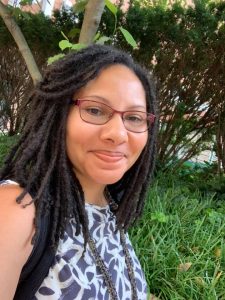
Spearheaded by Interim Senior Minister Rev. Kathleen Rolenz, in September 2021, the All Souls Church Unitarian Board of Trustees approved the use the A. Powell Davies Endowment to provide on-going funding for those engaged in formal study of church leadership. As a result, I became the first A. Powell Davies Intern to served under this new purpose.
As a leader-church and teaching congregation, All Souls serves as a role model in nurturing and supporting excellent leaders in ministry. As the first A. Powell Davies Intern, I am deepening my grounding in our faith for the work of the world to which I am being called. My role is to honor the legacy of A. Powell Davies through “carrying out in spirit and action the work and philosophy of Dr. Davies”.
As a seminarian, I will earn a Master of Arts in Leadership Studies (MALS) degree at Meadville Lombard Theological Seminary. This undertaking provides spiritual leadership skills transferable to both traditional parish and non-traditional contexts. I am learning how to lead, follow, and collaborate deeply with others from a spiritual perspective. I am learning how to connect ethical decision-making with the practical need for sustainability, growth, and results.
I have come to understand that in the Unitarian Universalist denomination, not only do we need Ministers to minister, but we need competent leaders to lead ministries. I am not pursing a traditional path of parish ministry, yet my path does include being a leader and having a ministry.
Just as it takes a village to raise a child, it takes a village to create and nurture beloved community. It takes many beloved communities to change the world. I’m so grateful for the opportunity to explore my calling to this Ministry of Leadership at All Souls!
Are you interested in applying to become the next A.P Davies Intern? Please reach out to our ministry team.
